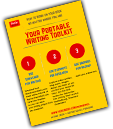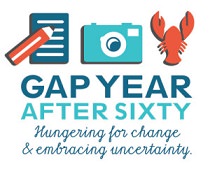Help! I need a book editor
 Whether you are an experienced nonfiction author or a first-time Beta Author, you need an editor. It doesn’t really matter where you are in the process of writing your book. It could be an idea stuck in the back of your throat. Maybe you’ve written a dozen or 300 blog posts (yay Michele!) and you know they could be turned into a book. Maybe you’ve banged out 20 or 50 or 100 pages.
Whether you are an experienced nonfiction author or a first-time Beta Author, you need an editor. It doesn’t really matter where you are in the process of writing your book. It could be an idea stuck in the back of your throat. Maybe you’ve written a dozen or 300 blog posts (yay Michele!) and you know they could be turned into a book. Maybe you’ve banged out 20 or 50 or 100 pages.
You need an editor to help you turn your idea into a professional manuscript. This is not a sign of weakness. Needing an editor doesn’t mean that you are less of a writer. Using the services of an experienced editor to get across the finish line means you are deadly serious about shipping a book. It means you are clear-eyed about publishing a book that is highly professional, stylish and substantive and that meets your business goal of enhancing your credibility.
Want help writing a short book?
Are you interested in learning more about writing and publishing a short eBook? My popular Beta Author program gets into the trenches to help you write a compelling nonfiction book. It also covers how and when to work with a book editor, best practices in cover design, how to choose a killer title, how to price your eBook to sell and more.
But finding and vetting a freelance book editor who is right for you and your work is not that easy. We’ve spent several weeks (more time than we’d like to admit) researching and writing this post.
This is not our last word on how to find and hire an editor. Working with an editor is a topic we will be revisiting and digging into again as Voxie Media puts together a stable of first-rate nonfiction book editors for our authors.
What does a book editor do?
First we have to define what a book editor is. There are several varieties and it’s key to the success of a book – even a short book – to know which does what. And where in the process you might need one.
Needing an editor doesn’t mean that you are less of a writer. Using the services of a professional editor to get across the finish line means you are deadly serious about shipping a winning book.
Developmental editor: coach and collaborator
In a nutshell, a developmental editor looks at your big idea and helps you strip it down and build it back up into a compelling story that will engage and motivate your reader. He or she asks you lots of questions like: What is the goal of your book? Who is your intended audience? How will your book benefit your readers? Why will they buy your book?
Then he or she helps you find a structure or framework to build your story around. Yes, even business books are built on stories. That’s what makes us want to read them. Sometimes the framework – the way you present and organize your message – is what makes a book on a business topic stand out.
Think about Gretchen Rubin’s best-selling The Happiness Project, built around a 12-month calendar of her exploration of happiness. Or John Warrillow’s Built to Sell, a can’t-put-down business novel on how to grow and position your small company to sell it.
Developmental editors are sometimes called content editors or consulting editors.
Literary agents also do developmental editing. As do acquisition editors at big publishing houses. But you don’t need a contract with a traditional publisher to get this kind of help.
Note: participants in Beta Author Boost get in-depth developmental editing from moi, Voxie Media publisher and CEO.
Copyeditor: grammar police (thank god) and collaborator
Copyeditors (sometimes called line editors) get down into the paragraph and sentence level, correct your grammar and syntax and make your prose sing… but still sound like you. That is, if they’re really good. That’s key, because you want to work with someone who is sensitive to your voice and your style. Every writer can benefit from a great copyeditor.
Proofreader: essential cleaner-upper
Finally, proofreaders clean up any remaining typos after copyeditors have worked their magic. They are the least expensive kind of editor, but their services are extremely important. A book can be beautifully written and edited. But if readers find even a couple of typos, your credibility as an author plummets.
How do you find an editor?
We know that talented and experienced book editors are available for hire because of massive downsizing by the Big Six publishers. But how do you find and vet a freelance editor for yourself? It can be overwhelming to select someone from online listings.
Getting a recommendation from a colleague – another author or someone who has worked in traditional publishing – is probably the best route. But here are a handful of resources worth checking out.
Editorial Freelancers Association
The Editorial Freelancers Association is a well-respected group based in New York. It has been around for years. You can submit a job posting as well as search for an editor in a geographic area or with a particular expertise (developmental, line editing, proofreading).
Publishers Marketplace
Publishers Marketplace are the folks who publish the popular daily email, Publishers Lunch (there is a free and paid version), with all the latest deals and news about the publishing industry. To get access to their member listing, you need to join the site ($20 a month.) I searched Members under “editorial services” and found 90 listings.
MediaBistro
MediaBistro has a long list of best book editors on Twitter. They also have a freelance marketplace which lists hundreds of editors. You can narrow it down by looking for certain types of editors (content editor, copyeditor, etc.). Note that they are not all book editors, per se.
Hiveword
This writers’ resource is courtesy of Jane Friedman (a former publishing exec and a brilliant blogger on the future of publishing). Check out Hiveword results for book editor.
Put freelance editing or a variation thereof in the search box for groups. You will find the Freelance Editing Network, Publishing and Editing Professionals and many others. Some of these groups require you to “join.”
Author and publishing expert Joanna Penn used Twitter to find her editor, @noveldoctor. Don’t laugh. Twitter can be a great way to make contact with talented folks. It helps if you have a large following yourself as more people will see your Tweet query for a book editor. Try using a hashtag like #editor. Results not guaranteed.
Writer Beware
Writer Beware on Independent Editors
A few editors we recommend
Based on our own research and referrals we trust, here are a few editors we recommend for nonfiction business books:
Barbara McNichol (has worked with several Beta Authors)
Betsy Rapoport (recommended by Pam Slim)
Christine Pride (recommended by Nathan Bransford)
June Eding (formerly with Penguin)
Alan Rinzler (publishing industry veteran)
5 E – 5 freelance book editors who are veterans of Big Six Publishing
Download 5E’s winter 2012 newsletter [links to article where you can download the PDF]
We’d love to expand this list. Please leave a note in the comments if you can recommend an experienced book editor who specializes in nonfiction and business. Or if you want to add to the conversation about hiring and working with an editor. Huge thanks – Debbie Weil
Other resources
A list of freelance book editors by literary agent and prolific blogger Rachelle Gardner.
The Editorial Department (recommended by Jeff Goins)
Scribendi (click here to see their spot-on infographic comparing editing with proofreading)
Writer’s Digest 2nd Draft Critique
About Ghostwriting and Hiring a Ghostwriter
Kirkus Reviews now has an indie division and offers book editing services for independent authors.
Self-publishing packagers like Fast Pencil offer book editing services (we have not tried them).
For proofreading and light copyediting, you might want to try eLance or oDesk. I have used oDesk for transcription and been very pleased. Again, results not guaranteed.
How much does a book editor cost?
For a sample of editorial rates, check out the Editorial Freelancer Association’s rate chart. You’ll see fee differences laid out for developmental, copyediting, line editing and proofreading. Fees can range widely, of course, depending on how well-known or in-demand the editor is.
Useful reading
Joanna Penn on Why You Need a Professional Editor for Your Book
David Kudler on 7 Deadly Myths and 3 Inspired Truths About Book Editing
Marcy Kennedy on What Type of Edit Does Your Book Need?
Veteran book editor Alan Rinzler on When Do You Need an Editor?
Alan Rinzler on Choosing a Freelance Editor: What You Need to Know
India Drummond on Hiring a Freelance Editor
Tiffany T. Cole on Hiring a Freelance Editor: A Step-by-Step Guide
List of service providers for eBook publishing courtesy of Elizabeth Spann Craig (via book doctor Jason Black)

-
http://www.itsunderstood.com/ Sue Johnston
-
http://voxiemedia.com/ Debbie Weil
-
-
Dick Margulis
-
http://voxiemedia.com/ Debbie Weil
-
-
http://winningedits.com/ Matt Gartland
-
http://www.jimburson.com/ Jennifer Lyle
-
http://voxiemedia.com/ Debbie Weil
-
-
Alan
-
http://voxiemedia.com/ Debbie Weil
-
-
Brett Battles
-
Brett Battles
-
-
Catherinerankovic

 Want to reinvent your life and work after age 60? Follow Sam and me as we reinvent a yin yang life on the coast of Maine and in Brooklyn.
Want to reinvent your life and work after age 60? Follow Sam and me as we reinvent a yin yang life on the coast of Maine and in Brooklyn.







